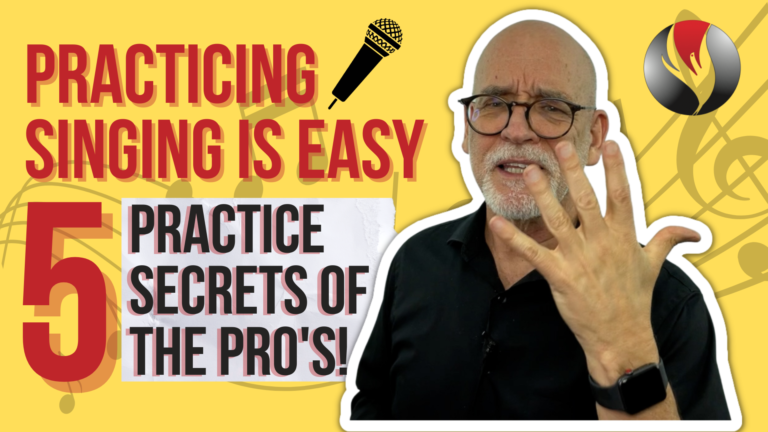When you sing high notes does it feel like you have to strain as you sing higher? A primary cause of this is the vocal cords are not making the right adjustment. But you can control the vocal cords so you can sing high notes without straining or disconnecting. Watch and see how!
Hi, I’m Chuck Gilmore with Power to Sing.
When you sing high notes and feel a lot of strain, your vocal type is likely Pulled Chest/High Larynx. There are several reasons why it feels like a lot of strain. In this episode I’m going to talk about the role of the vocal cords.
Why you Feel Strain When you Sing High Notes
When you sing low notes the vocal cords are short and thick. As you sing higher, the vocal cords try to stretch and thin to reduce their overall mass or weight. This will help you sing in your head voice.
As you sing higher there is a “handoff” that is suppose to occur from one portion of the vocal cord structure to another.
If your vocal cords keep too much mass or weight this transition will not be able to occur. If we keep going higher, eventually we will break into falsetto.
Sometimes we hold on so tight that it sounds yelled and splatty. To keep going higher you sing louder. This causes the vocal cords to tighten even more as they resist the air from your lungs.
This is classic pulled chest voice. It’s more obvious as you sing high notes louder and higher. Essentially you are bringing your lower chest voice with thicker vocal cords higher and higher into the the area of the voice that should be head voice.
Singers who do this regularly develop vocal problems, including hoarseness, hemorrhages or vocal nodules. If you don’t learn to sing correctly, this kind of singing can result in surgery and/or the loss of a singing career.
In the Knowledge Center, go to Pulled Chest/High Larynx and watch the video mash-up of several singers pulling chest. Several of these professionals have had surgery on their vocal cords because of this vocal abuse.
These are examples of how not to sing exactly because they lead to these vocal problems.
How to Thin the Vocal Cords as you Sing High Notes
- Reduce the volume, especially as you sing higher. Bringing down the loudness will immediately help reduce the mass of the vocal cords.
- Maintain the vowel. Don’t let it go wider and you sing higher. A simple demonstration would be singing “a”. As I sing higher if I let it go wider it thickens the cords. [Demo]
Can you hear how the vowel is widening…it’s getting broader. You can hear that thickening result on the vocal cords itself. In a moment I’ll show you a contrasting approach to that.
I just performed the role of “The King” in the King and I. At the close of his song, A Puzzlement, the note repeats on the e above middle C. The words are “If my Lord in Heaven Buddha show the way, every day I try to live another day”. Watch as I illustrate reducing volume. I’m going to do it a little bit louder and then I’ll bring the volume down. [Demo]
Next listen what happens when I allow the vowel do spread wider on the word “way” notice how it splats” I can also feel my vocal cords thickening and I feel much more strain. [Demo]
- Special strategy: Narrow the vowel from a to an Irish “ae” to prevent it from opening and splatting.
Listen as I narrow the vowel “way” closer to an Irish “a” w“ae”y. Listen. [Demo]
Here’s two vocal exercises to reduce the mass of the vocal cords so you can transition into head voice instead of pulling chest voice up.
These are beginning steps to help you feel the vocal cords reduce in mass. You have to learn to accept this new feeling before you can easily do it in songs. These exercises help you feel what it’s like to reduce the mass of the vocal cords and what that might feel like as you sing high notes.
- Lip Trills on a 5-Tone Scale [Demo]
- Ney Ney Ney on a 5 Tone Scale [Demo]
I’m doing that a capella but you get the idea. You can hear how the vocal cords thinned as the resonance goes higher. I’m not doing it loud. On the Ney’s I’m adding just a little bit of a bratty sound.
Do you know your vocal type? I’m not talking about whether you are soprano, alto, tenor or bass. Your vocal type is what you tend to do when you sing.
Personally, my vocal type is Pulled Chest/High Larynx. That’s one reason why I know so much about this vocal type. That’s what I tend to do when I sing.
To discover your vocal type visit PowerToSing.com and take the vocal test, which I call the PowerTest, and get your vocal type. Then watch the videos about your vocal type in the Knowledge Center. Download the free exercises for your vocal type and start improving your voice immediately.
I’m Chuck Gilmore with Power To Sing. You can sing higher, with beauty, confidence and power. I’ll see you inside the next video.












Responses
Great! Thanks David!
Thank you!!! This is exactly how I feel and I totally understand this.
Thanks Doug!
Thank you Chuck for educating me on what is happening as I stretch for those high notes. I am not a great singer, nor do I desire to perform, but I do love to sing so any help is appreciated.
I do, however, appreciate excellent singers and performers like yourself, and applaud your gifts and talents and the hours you spend in enriching our lives with your professionalism.